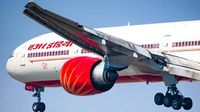Air India (AI) continues to grapple with service issues on its long-haul flights, as reports surface about crew members utilizing business class seats for rest while paying passengers are downgraded to economy. The Delhi (DEL) to Chicago O’Hare (ORD) route, covering 12,080 kilometers, appears to be a particular hotspot for such concerns.
Despite efforts to modernize the airline following its privatization and fleet renewal plans, disturbing trends of seat manipulation have emerged from several passengers on the Chicago-Delhi route. Passengers have reported that when boarding, they were informed of "technical issues" with their business class seats, especially the inability to recline, and were then handed forms for seat reassignment, with economy class accommodations offered as compensation.
One passenger discovered that the "broken" business class seat only had a minor issue with its tray table. Upon further inspection, she realized that entire rows of business class seats had been cleared, only for the crew to occupy them for rest during the flight. This behavior was not a one-time occurrence. Other travelers confirmed that they had encountered similar experiences on their previous Air India flights. The forms presented to passengers on these routes include pre-printed "technical issue" details, suggesting these incidents are not isolated, but rather part of an established pattern.
Air India’s ongoing service issues reflect broader organizational challenges, rooted in its previous years as a state-owned enterprise. Prior to privatization, the airline dealt with deteriorating cabin interiors, financial mismanagement, and a problematic service culture that included unauthorized upgrades and a lack of customer service. The airline’s recent privatization under the Tata Group’s ownership was expected to signal a new era of change. Alongside new aircraft orders to modernize its fleet, Air India aims to assert itself as a competitive global carrier.
As India’s aviation market grows, Air India seeks to position itself as the airline representing the world’s most populous country. However, while investment in new aircraft is a step forward, a true transformation will require tackling long-standing corporate cultural issues and improving employee practices. The persistent problem of crew members taking premium seats while paying passengers are downgraded highlights the significant work still needed to align the airline’s service delivery with international standards.
In an effort to address service quality concerns, Air India has implemented a new travel policy under the leadership of the Tata Group. Starting April 1, 2025, the airline will require all employees to fly economy class on domestic routes, with senior pilots transitioning to this policy in June 2025. Employees will only have access to premium seats if there are unsold seats 50 minutes before departure, ensuring that paying passengers take priority for premium seating. This policy extends to all levels of the organization, including the CEO, reflecting Air India’s commitment to equal treatment and transparency.
The airline currently offers 50,000 premium economy seats each week across 39 domestic routes, with plans to increase this to over 65,000 by October 2025, in line with expanding premium travel options. Air India’s modernization efforts are also reflected in its ongoing US$400 million cabin retrofit program. The airline is upgrading 53 Airbus A320 family planes from the merged Vistara fleet, with each aircraft featuring 24 premium economy seats. Sixteen of these aircraft have already been upgraded, with 25 additional planes scheduled for retrofit completion by October 2025.
While global supply chain constraints have delayed some of the upgrades, Air India remains committed to its modernization strategy. The airline’s new policies and investments in fleet upgrades indicate a clear commitment to elevating its service offerings, but the road to change will require continued focus on internal practices and employee behavior. Air India’s challenges on long-haul routes highlight the complexities of transforming a legacy airline into a competitive global player.
While new fleet acquisitions and cabin retrofits are promising steps, addressing deep-rooted organizational and cultural issues remains essential. The airline’s new employee travel policy and commitment to service improvements under Tata Group ownership signal a positive direction, but it is clear that significant work is required to ensure that service delivery meets international expectations. Only by transforming both its operations and its internal culture can Air India achieve long-term success in the fiercely competitive aviation market.





